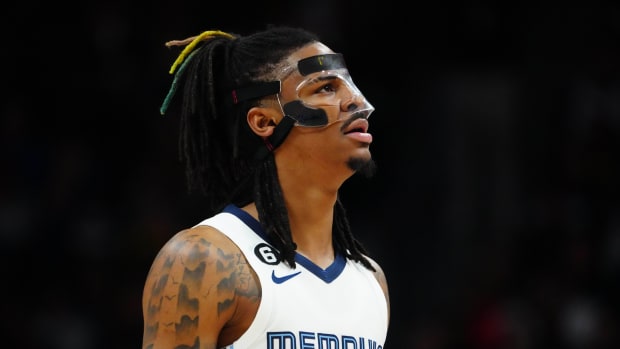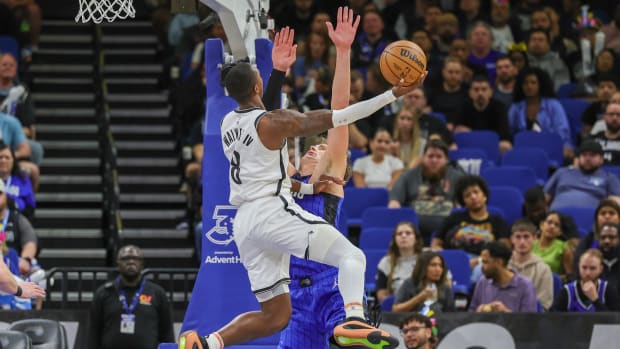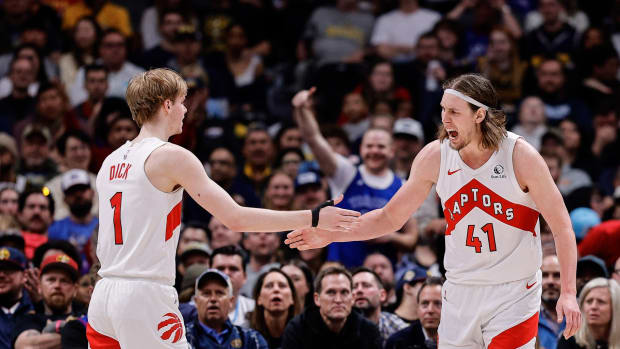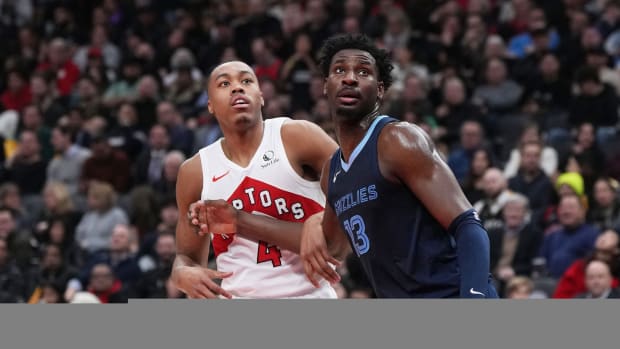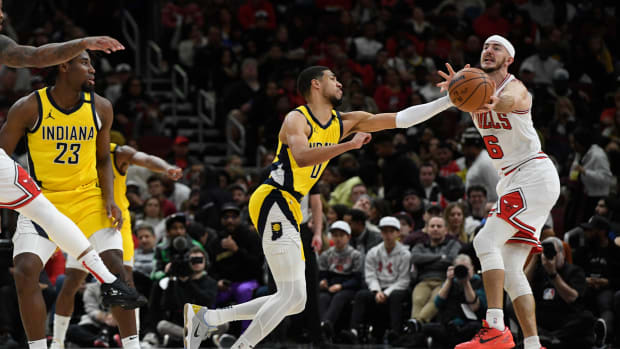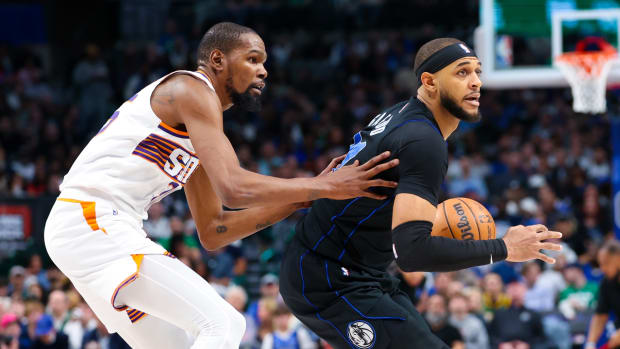We All Want Ja Morant to Grow
Editors’ note: This story contains alleged accounts of sexual misconduct. If you or someone you know is a survivor of sexual assault, contact the National Sexual Assault Hotline at 1-800-656-4673 or at https://www.rainn.org
Even with the usually disappointing Knicks on absolute fire, a seemingly wide-open title race and Nikola Jokić looking as if he’ll close in on a rare, third straight MVP award in a row, it would be foolish to pretend that one NBA story line hasn’t taken priority over the others of late.
Ja Morant, the high-flying 23-year-old Grizzlies superstar, will sit out at least two games following an Instagram Live video in which he appeared to brandish a gun. The NBA is still investigating the incident, while reports emerged Monday that police in Glendale, Colo., are also looking into whether Morant violated any gun laws there.
Plenty has already been written and said about the point guard, who has come under fire in recent months: That he’s walking a dangerous line—particularly within the context of Memphis rapper Young Dolph’s fatal shooting in 2021—and runs the risk of losing everything he’s worked to gain. That those around him—his father, his friends—need to be doing more to keep him in line. So on and so forth. It’s not my place to tell him or anyone else how to live. Even if it was, I probably wouldn’t have much else to add.
There is one thing about this entire issue that is grating on my nerves, though. I worry that some folks—the athletes and some fans who wish them well—are advantageously invoking mental health when it comes to explaining why players need the time away, even when it’s somewhat evident that the highly problematic behavior is what prompted the sabbatical in the first place. And it seemingly reduces the idea of getting help to convenient, fallback phrasing whenever a recognizable name slips up in the public eye.
Earlier this season, for instance, second-year Spurs guard Joshua Primo explained he was taking time away to “focus on my mental health treatment more fully” in the wake of his stunning release from the club. Soon after, reports surfaced that former team psychologist Dr. Hillary Cauthen had complained about Primo allegedly exposing himself to her a number of times during private sessions. (Cauthen also said the team took no action against Primo initially following her January 2022 complaint and declined to renew her contract after the accusations. Cauthen filed suit and the two sides reached a settlement back in November, mere weeks after cutting Primo from the club.) It made the sudden announcement to prioritize mental health look like more of a cover than anything else. While it’s not useful to compare what Primo is accused of doing to Morant’s alleged behavior, the focus on mental well-being in subsequent statements in both cases is similar.
Morant didn’t explicitly cite mental health, and he said he took full responsibility for his actions. But his statement also said, “I’m going to take some time away to get help and work on learning better methods of dealing with stress and my overall well-being.”
Morant has discussed mental health before. When Taylor Rooks of Bleacher Report raised the issue following his time in the COVID-19 pandemic bubble, Morant said he’d struggled with overthinking but hadn’t tried therapy, citing issues with trust and his general belief that he had a good life.
To be crystal clear: I’m not downplaying how vital mental health is, to me or anyone else. I have found therapy to be life-changing stuff for me and for those around me, and would recommend anyone take part in it if they have that ability.
That said, I do grow concerned when I see it hinted at in the aftermath of bad press stemming from a public incident, and after an organization begins investigating the matter. I don’t like the idea of it becoming a shield from critiques or explanations for bad behavior. The bright side to all this is simple: Morant has an abundance of people in his corner willing to help him, plenty out of pure love and some out of self-interest, given how central he is to Nike and Powerade and an NBA team’s title hopes.
Morant has now been named in or tied to four allegations that have been in the media since last summer. Aside from this latest case, those include:
- An allegation from members of the Pacers’ traveling party that someone in a slow-moving SUV, in which Morant was traveling, trained a red laser on them. It followed a January game in Memphis in which Morant’s father, Tee, and a close friend got in a courtside shouting match with members of the Pacers. (The NBA investigated and decided against disciplining Morant.)
- An allegation from a 17-year-old last summer who said Morant punched him in the face—and that Morant’s friend also punched him repeatedly—during a game of pickup ball at Morant’s house. The teenager claimed that, as he was walking to his car, Morant came back outside with a gun tucked in his pants and had his hand on it. (Morant claimed to be acting in self-defense—he was reportedly hit in the head by a hard pass the teen threw at him at the beginning of the incident—and police didn’t charge him. His agent denied the allegations, but the teenager’s family filed suit, which is under seal.)
- Four days before the alleged run-in with the teenager, Morant’s mother reportedly had an argument with a store employee at a local mall, prompting Morant to come by. According to The Washington Post, Morant and nine other people arrived. The security guard on duty eventually told the group to leave, but they refused, prompting police to respond. Things reached a boiling point and “someone in the group pushed the security director in the head,” according to the Post. “As the group was leaving the premises … Ja Morant said, ‘Let me find out what time he gets off,’ police wrote in the report.”
It’s the totality of this that makes some responses to the Denver incident look asinine.
Former NBA star Paul Pierce, who was almost fatally stabbed back in 2000, said he understood exactly why Morant would carry around a gun.
What’s left out in that analysis is the massive difference between concealed carry and needlessly waving around a gun on Instagram Live while dancing in the club.
A few media voices have emerged with words of advice that could make an enormous difference in Morant’s career. ESPN’s Jalen Rose spoke on his experiences during his younger years in the league, and Hall of Fame writer Marc J. Spears had a cogent piece for Andscape drawing from Carmelo Anthony’s early career missteps and his decision to put a team of business and personal managers around him. If he’s receptive, Morant could seemingly learn from both. In turn, the rest of us might be able to enjoy watching one of the most entertaining athletes for the next decade and a half.
We all want Morant to grow from this. We certainly want him happy and healthy, and to avoid becoming a cautionary tale. I also believe we can be far more precise and responsible in how and when we talk about mental health. It shouldn’t largely become a deflection tool when punishment is being handed down, particularly when other people may have been victimized in other incidents leading up to this.
Meat and potatoes: Good reads from SI and elsewhere this past week
• Chris Mannix tackled a pair of topics: a column on Morant and how he could go from having everything to losing it all; and one on Lakers star Anthony Davis, and how he’s being asked to do something he hasn’t done in years as LeBron recovers from a foot injury. (I wrote about the flip side of all that, opining that LeBron’s injury raised the question of why Los Angeles waited so long to deal Russ.)
• Mannix also has a phenomenal Daily Cover piece today on Shai-Gilgeous Alexander and how he’s powered the surprising Oklahoma City Thunder.
• Rohan Nadkarni ranked the 11 clubs he sees as true title contenders. He also wrote on Kevin Durant’s debut with Phoenix. The early returns—3–0 so far—have been phenomenal, not only from Durant but also from Devin Booker, who’s had 35 or more in each of his first games alongside his new superstar teammate.
• I spent time in Sacramento recently and chatted with Coach of the Year front-runner Mike Brown about the Kings, who stand as arguably the biggest surprise of the 2022–23 NBA season thus far. Here’s a Q&A from that convo.
• Kyle Wood handled our power rankings, placing the Bucks at the top.
• New York Times reporter Tania Ganguli had a funny, if somewhat sad, piece stemming from the trade deadline. We often hear about how trades instantly shake up life for the players involved. But what about the players’ dogs? Uno and Sonny, who belong to Cam Payne and Mikal Bridges, respectively, transitioned from best pals to long-distance pups, now that Bridges has gone from Phoenix to Brooklyn.
• Marcus White of the San Francisco Examiner: The Warriors claimed to do due diligence on Anthony Lamb, who was accused of rape in a lawsuit last year. But that process never involved the team reaching out to the woman or her attorney. Instead, Golden State said it reached out to the NBA and Lamb’s former teams. The story comes as the Dubs celebrate Women’s Empowerment Month in March.
• Julie DiCaro of Deadspin highlighted a wild story out of Alabama: That a youth girls basketball team was told they’d lose their practice facility unless they played in the boys league. The team then made the conversion and won said league but weren’t awarded trophies. Instead, those trophies were given to the boys, according to the mother of one of the girls playing in the league.
• Jeff Schultz of The Athletic caught up with Hawks owner Tony Ressler about what’s been a disappointing season of upheaval in Atlanta.
• Couper Moorhead, who writes for the Heat and is one of the smartest writers in the sport, wrote about the notion of staggering star players, and why that idea isn’t quite as simple as it seems with Jimmy Butler and Bam Adebayo.






























